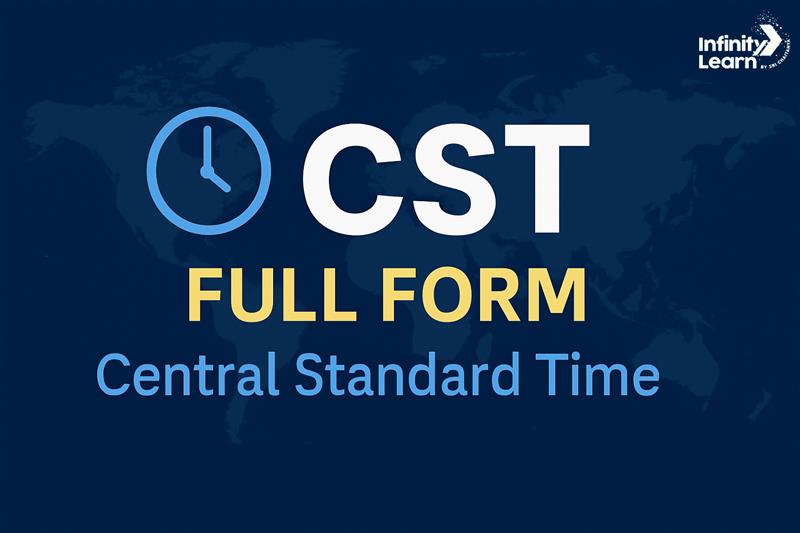Table of Contents
CST Full Form is Central Standard Time. Time is very important in our lives. It helps us plan our day, go to school, work, or even enjoy fun activities at the right time. But did you know that different parts of the world follow different times? Yes! This is because the Earth is very big and the sun rises and sets at different times in different places. One such time zone is CST. Let us learn more about the CST Full Form and why it is important.

What is CST Full Form?
The CST Full Form is Central Standard Time. It is a time zone used in some parts of North America. When we say CST, we are talking about the time followed in the central part of the United States, Canada, and Mexico. This time zone is 6 hours behind Coordinated Universal Time (UTC-6).
This means if it is 12:00 noon in London (which follows UTC), then it is 6:00 AM in places that follow CST.
Do Check: AICTE Full Form
Why Do We Have Different Time Zones?
The Earth takes 24 hours to go around once. But because it is round and the sun only shines on one part at a time, it is day in some places and night in others. To manage this, the world is divided into 24 time zones. Each time zone is 1 hour apart from the next.
CST is one of these time zones. It helps people living in the middle part of North America to have the same time so that everyone knows when school starts, shops open, or buses arrive.
Where is CST Used?
The CST Full Form is Central Standard Time, and it is used in many places. Some of the main areas that follow CST include:
- Parts of the United States like Texas, Illinois, and Minnesota
- Parts of Canada such as Manitoba and parts of Saskatchewan
- Northern and central parts of Mexico
People in these places use CST for most of the year.
CST and Daylight Saving Time (DST)
There is something called Daylight Saving Time (DST). In many places, clocks are moved ahead by one hour in summer. This gives people more daylight in the evening. When this happens, CST becomes CDT (Central Daylight Time).
So, during winter months, these places follow CST (UTC-6). In summer months, they follow CDT (UTC-5).
Do Check: ADB Full Form
This change helps people enjoy more daylight in the evening and save electricity too.
How is CST Different from Other Time Zones?
There are many time zones around the world. CST is just one of them. Let us see how it compares with some other common time zones:
- EST (Eastern Standard Time): This is 1 hour ahead of CST. So, if it is 9:00 AM CST, it will be 10:00 AM EST.
- MST (Mountain Standard Time): This is 1 hour behind CST. So, if it is 9:00 AM CST, it will be 8:00 AM MST.
- PST (Pacific Standard Time): This is 2 hours behind CST. So, if it is 9:00 AM CST, it will be 7:00 AM PST.
This way, time zones help us keep track of time depending on where we live.
CST in Daily Life
Let’s say your friend lives in Chicago, USA, and follows CST. If it is 7:00 PM in India, it will be 7:30 AM CST in Chicago during winter. This helps you plan when to talk to your friend or attend an online class or event with someone from there.
People living in CST zone wake up, go to school or office, have lunch, and sleep according to this time. This way, all activities in that area are set as per CST.
Why Should You Know About CST?
Knowing about the CST Full Form and time zones is helpful because:
- It helps in talking to people living in other countries.
- It helps in watching international news or shows.
- It helps in understanding world events and their timing.
- It helps students and teachers when attending online classes with others from different places.
Do Check: ACC Full Form
Time Converters and CST
Today, it is easy to know what time it is in CST using mobile apps or websites. Just search “current time in CST” and you will get the right answer.
There are also time zone converter tools where you can enter your city and CST to get the time difference. This helps you plan meetings, calls, or games with friends in other countries.
Conclusion
Time zones are very useful. They help us stay organized and work better with people in different parts of the world. CST is one such important time zone. Now that you know the CST Full Form, you can easily understand when someone mentions CST in news, shows, or online events.
So next time you see CST, remember it means Central Standard Time. And you’ll know it’s the time followed in many parts of North America!
Do Check: ABG Full Form
FAQs on CST Full Form
What is the CST Full Form?
The CST Full Form is Central Standard Time.
Where is CST used?
CST is used in parts of the United States, Canada, and Mexico.
How is CST different from IST?
CST is about 11 hours and 30 minutes behind IST (Indian Standard Time).
What happens to CST during Daylight Saving Time?
During Daylight Saving Time, CST changes to CDT (Central Daylight Time).
Why is CST important?
CST helps people in the central part of North America follow the same time for school, work, and other activities.








